
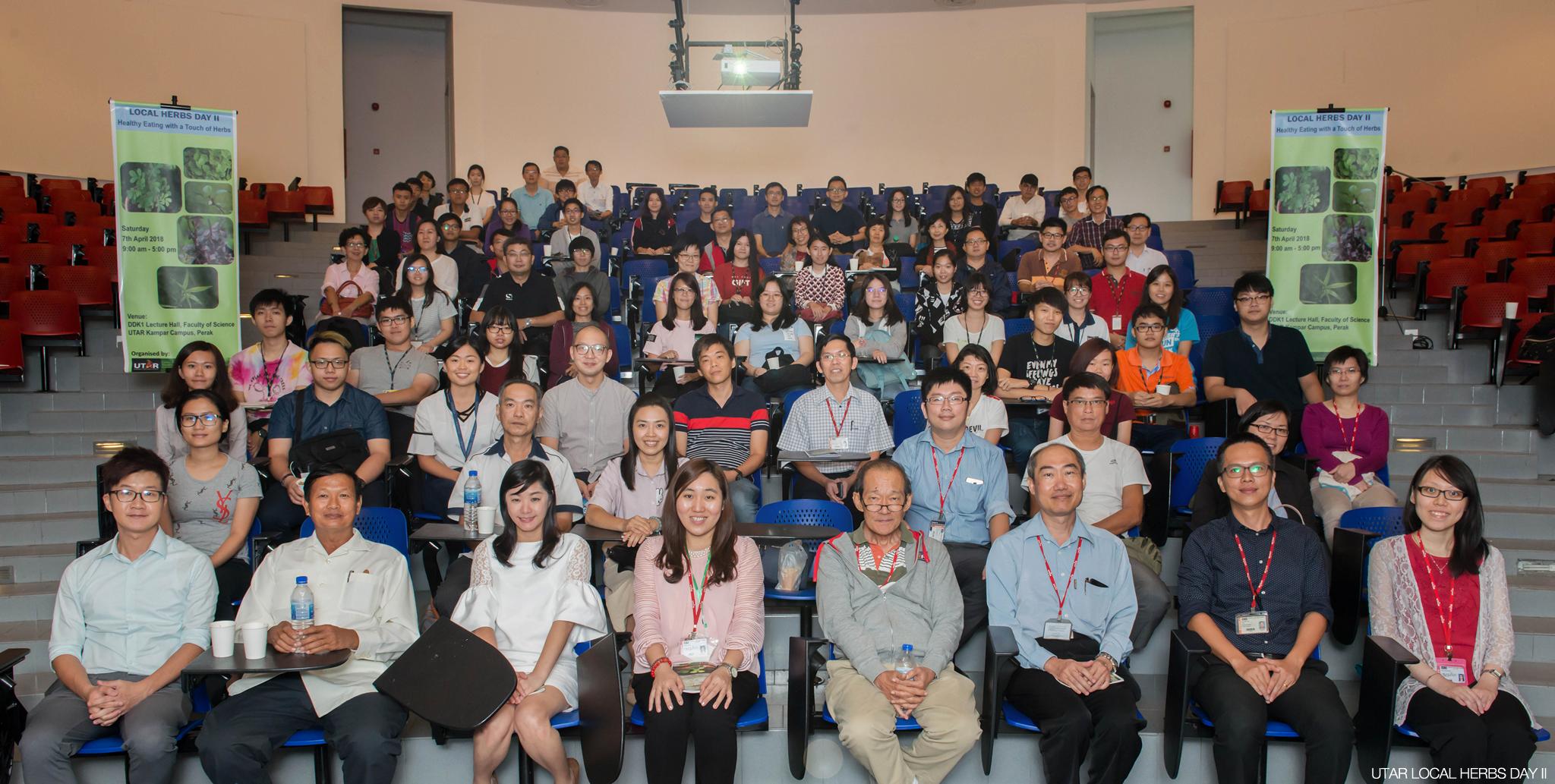
A group photo of the organising committee, speakers and participants
UTAR Centre for Bio-Diversity Research (CBR), Faculty of Science (FSc) and Institute of Postgraduate Studies and Research (IPSR) jointly organised the “Local Herbs Day II: Healthy Eating with a Touch of Herbs”. It was held at UTAR Kampar Campus on 7 April 2018.
The event aimed to facilitate knowledge sharing and provide exposure on the culinary uses of local herbs among the community as well as the students and staff of the University. More than 80 participants from within and outside the campus attended the event.
In her welcoming remarks, Organising Chairperson Dr Teh Lai Kuan said, “The use of herbs has become more common in our daily lives. We choose to use herbs because they are effective, safe and cost-effective complements or alternatives to pharmaceutical drugs. Also, for health maintenance. With the proper use of local herbs, our lives will definitely be changed in the best way possible. Besides that, I would like to take this opportunity to thank the organising committee for their hard work and the sponsors for making this event a success.”
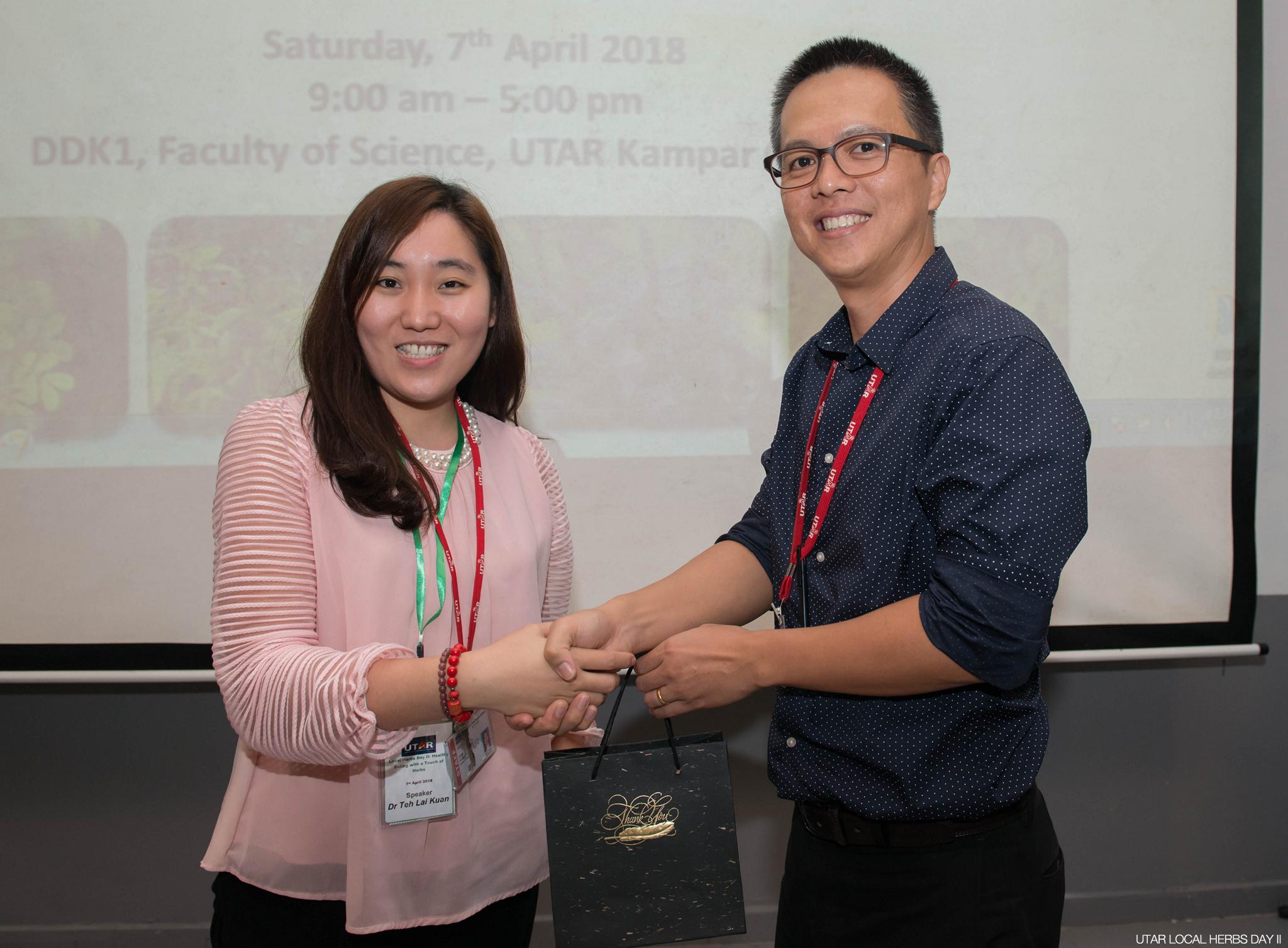
CBR Chairperson Dr Wong Wey Lim delivering a token of appreciation to Dr Teh
A talk was held after the opening ceremony and it was divided into three sessions. The first talk was conducted by Clinical Dietitian-cum- Head of BioMedical Science Department of FSc Dr Chee Huei Phing on “Role of Herbs in Healthy Eating – from dietitian’s perspective”. The second talk was conducted by Dr Teh on “Cooking with five elements (五行) – from Chinese physician’s perspective” and the third talk was conducted by Nutritionist Vanessa Lim Chew Siang on “Herbs in weight management – from nutritionist’s perspective”.
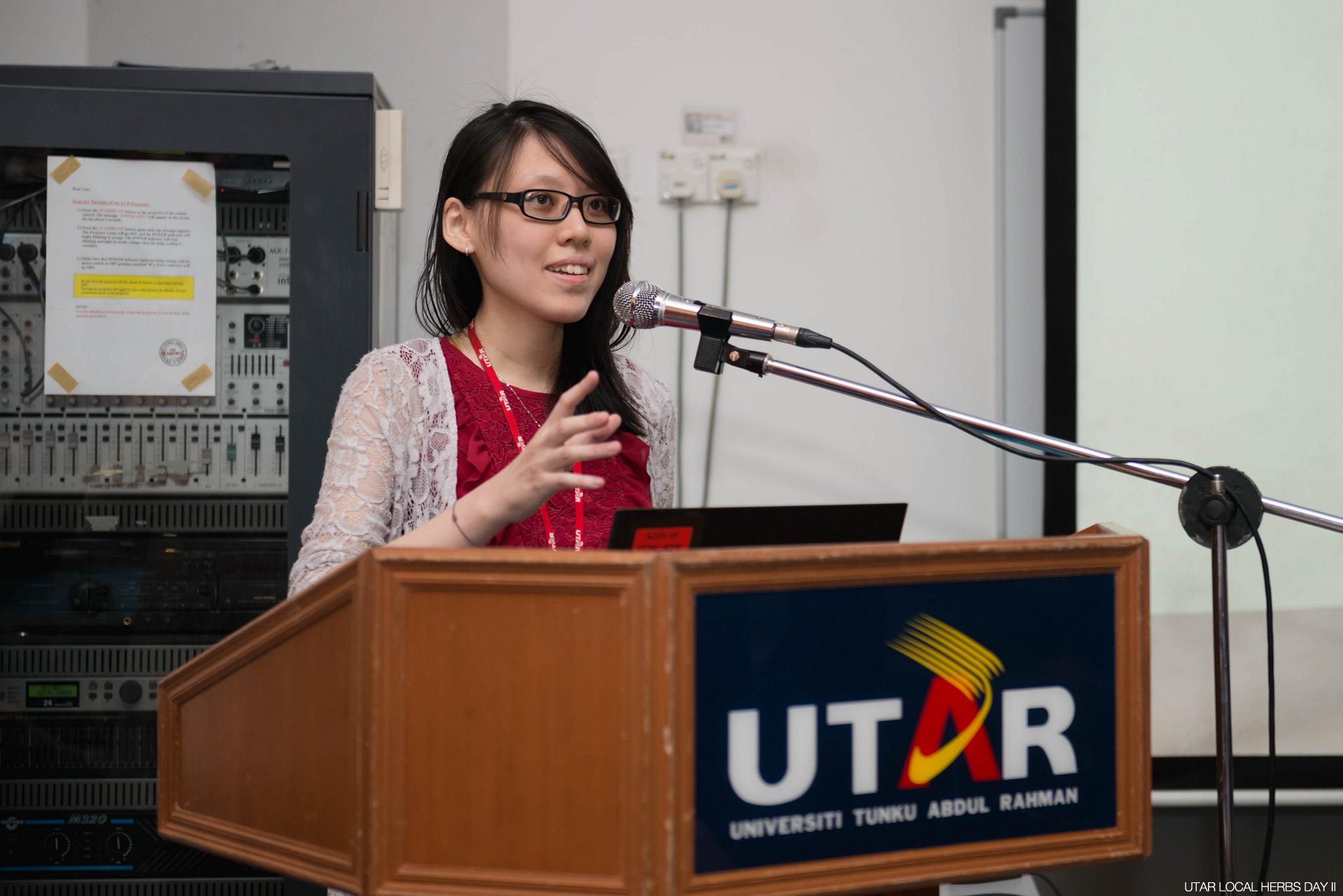
Dr Chee sharing about the role of herbs
Dr Chee has been actively involved in consulting and providing dietary advice to patients in the cardiology, diabetes, geriatric, renal, liver, oncology, intensive care unit, gastrointestinal and paediatric cases at government hospitals as well as community setting before she joined UTAR. From the dietitian’s perspective, she elaborated on the basic principle and the common practice of healthy eating such as having a regular meal time, observing daily calories intake and making wise food choices. She also talked about the role of herbs in healthy eating and said, “We can usually use herbs instead of food additives in our cooking because foods with herbs will enhance the flavour and aroma of the food. Reducing the intake of food additives will help one to scale down health risks. However, further scientific research is needed to make clinical recommendations regarding the health effects of specific herbs.” She also explained the usage of herbs such as stevia extract and cinnamon for diabetic patients, garlic for hypertensive patients, and precaution matters for patients with chronic kidney disease (CKD).
Moreover, she introduced the Traditional and Complementary Medicine Blueprint 2018-2027 (Health Care) which was launched by the Ministry of Health and the Traditional and Complementary Medicine Unit in certain government hospitals. The talk gained an active response from the participants.
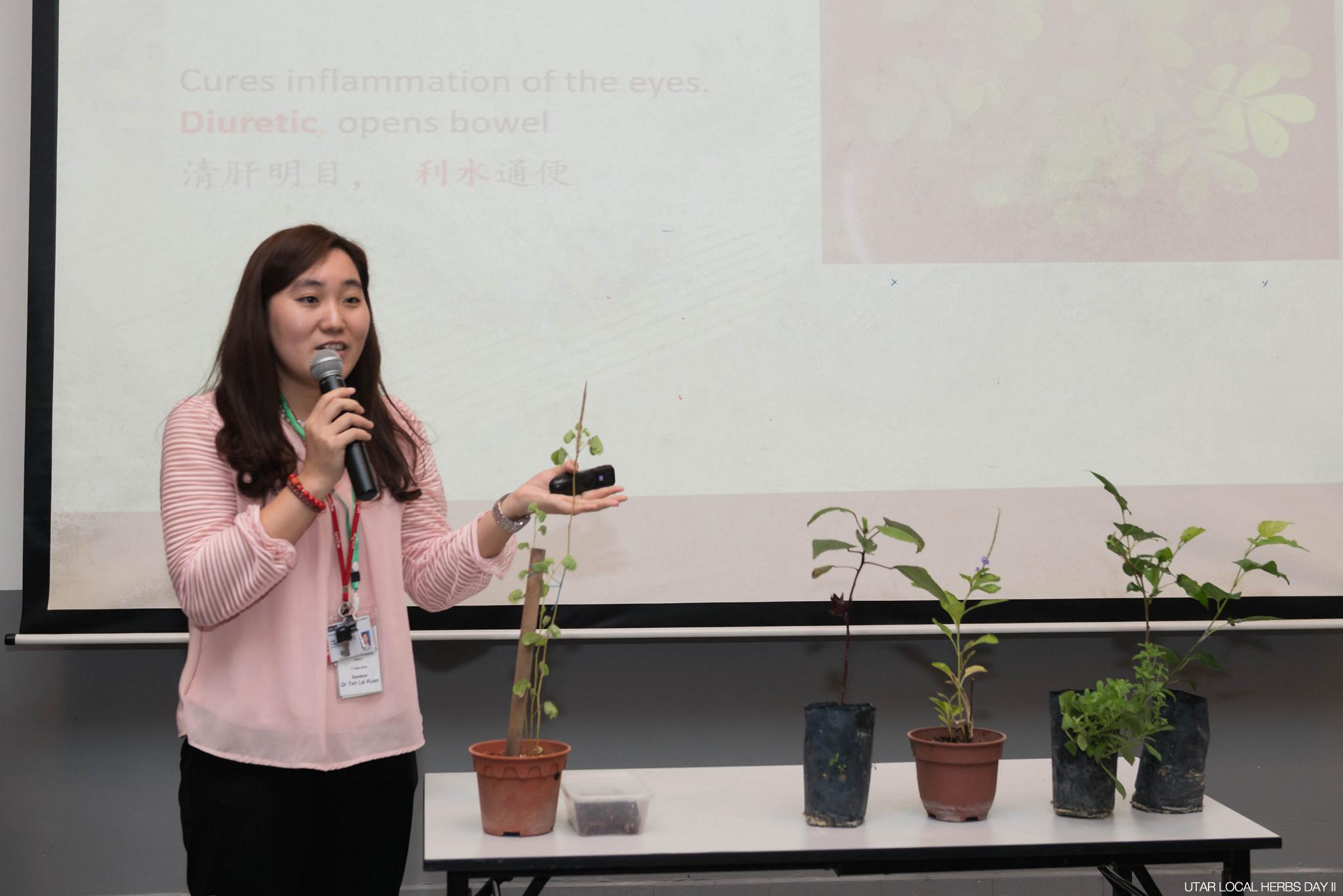
Dr Teh introducing the benefits of several herbs
Dr Teh is a registered practicing Chinese physician and a life member of the Malaysian Acupuncturists Association and Academic of Traditional Chinese Medicine Kuala Lumpur and Selangor. Dr Teh introduced the “five elements”, a very useful dietary theory in Traditional Chinese Medicine (TCM). It consists of wood (木), fire (火), earth (土), metal (金) and water (水). According to Dr Teh, the five elements represent the physiological functions of the five main organs, namely liver, heart, spleen, lung and kidney. The liver (wood) represents the circulatory system and the blood storage; heart (fire) represents the cardiovascular system; spleen (earth) represents the digestive system; lung (metal) represents the respiratory system; and kidney (water) represents the urinary system. She also mentioned that flavours (sour, bitter, sweet, umami and salty) and colours (green, red, yellow, white and black) of food are also used to represent the five elements respectively. She emphasised, “There is interrelationship among these five elements and balance must be kept in order to maintain the health of an individual. By understanding the patterns of disharmony and imbalances in the body, suitable food can be selected to help enhance an individual’s overall health.”
She then shared about the elements and application of some common and useful herbs, such as Morus sp (mulberry tree), Cassia obtusifolia L., Stachytarpheta jamaicensis (L) Vahl, Stevia rebaudiana (sweet leaf) and Hibiscus sabdariffa (roselle) to provide the participants with the basic knowledge of herbs according to the dietary theory in TCM.
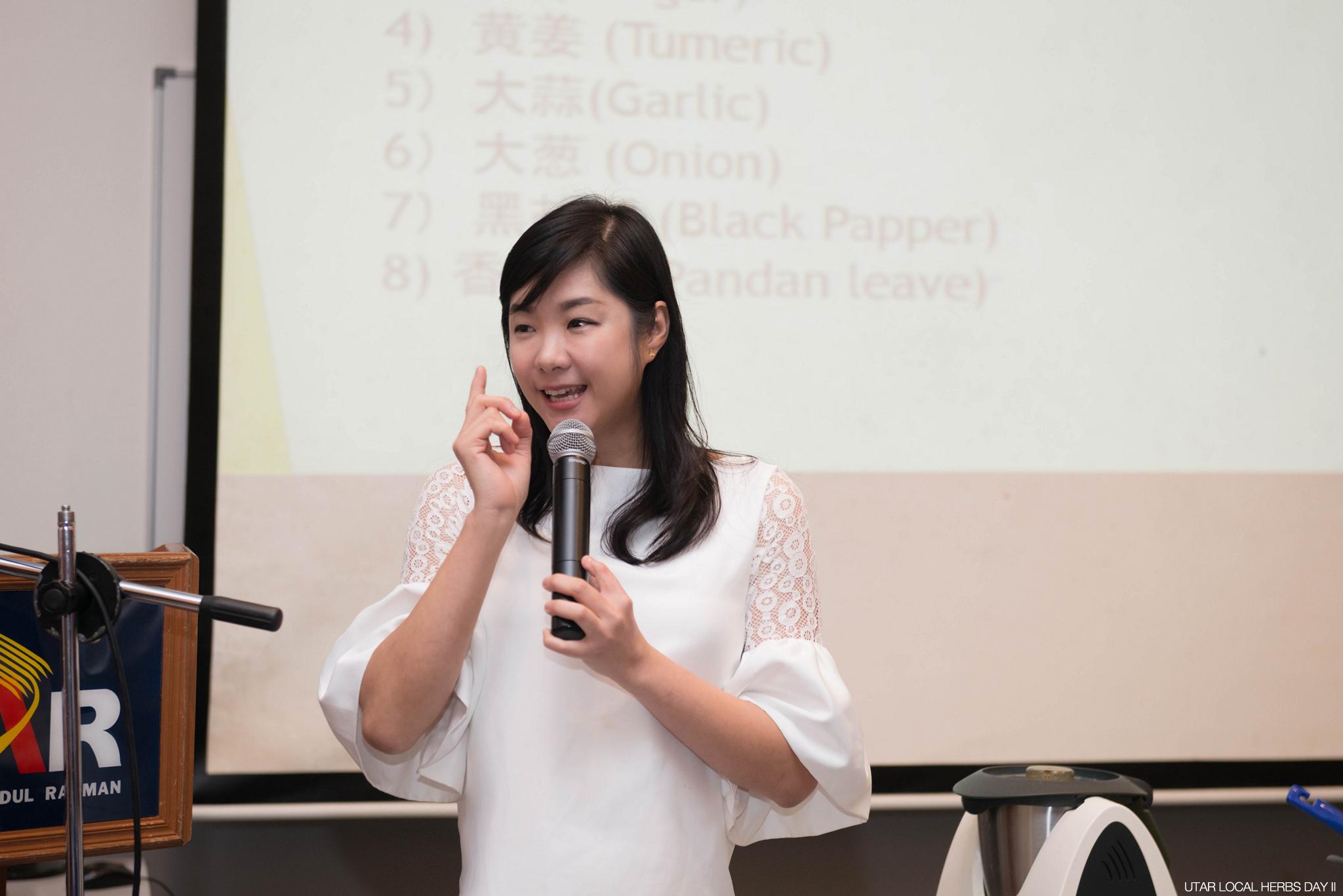
Lim revealing the role of herbs in weight management
Vanessa Lim is the owner of V Consultant Enterprise and has been working as a nutritionist for 10 years. She serves as the programme’s nutrition consultant. She was invited as guests for various health shows in ntv7, 8tv, Astro and Media Prima. She began by sharing the experience of recuperating her father’s kidney disease by using local herbs and also a few cases of her patients who cured their illness by using natural foods or ingredients in their daily meal. She shared about some herbs that will improve health, the difference between dried and fresh herbs, herbs for proper weight management, how to improve the nutritional value of herbs , herbs proven to help lose weight, daily herb intake and the suitability of herb intake.
According to Lim, the eight local herbs proven to help lose weight, such as wormwood, lemon grass, ginger, turmeric, garlic, onion, pepper and pandan leaves, are common, easily accessible and effective. In the talk, she also shared about some herbs for weight management based on her recipe, such as wormwood egg, nasi lemak sambal and whole grains paste.
The afternoon session was on “The response of certain local herbs toward nicotine” by a Chinese physician from FIG Enterprise Chan Chew Chok. Chan has more than 70 years of experience in herbs plantation. Before starting his demonstration, he introduced several medicinal herbs that were beneficial to humans such as fig, Randia spinosa and Dioscorea Bulbifera. FIG Enterprise sponsored fig drinks and their published TCM book to the participants.
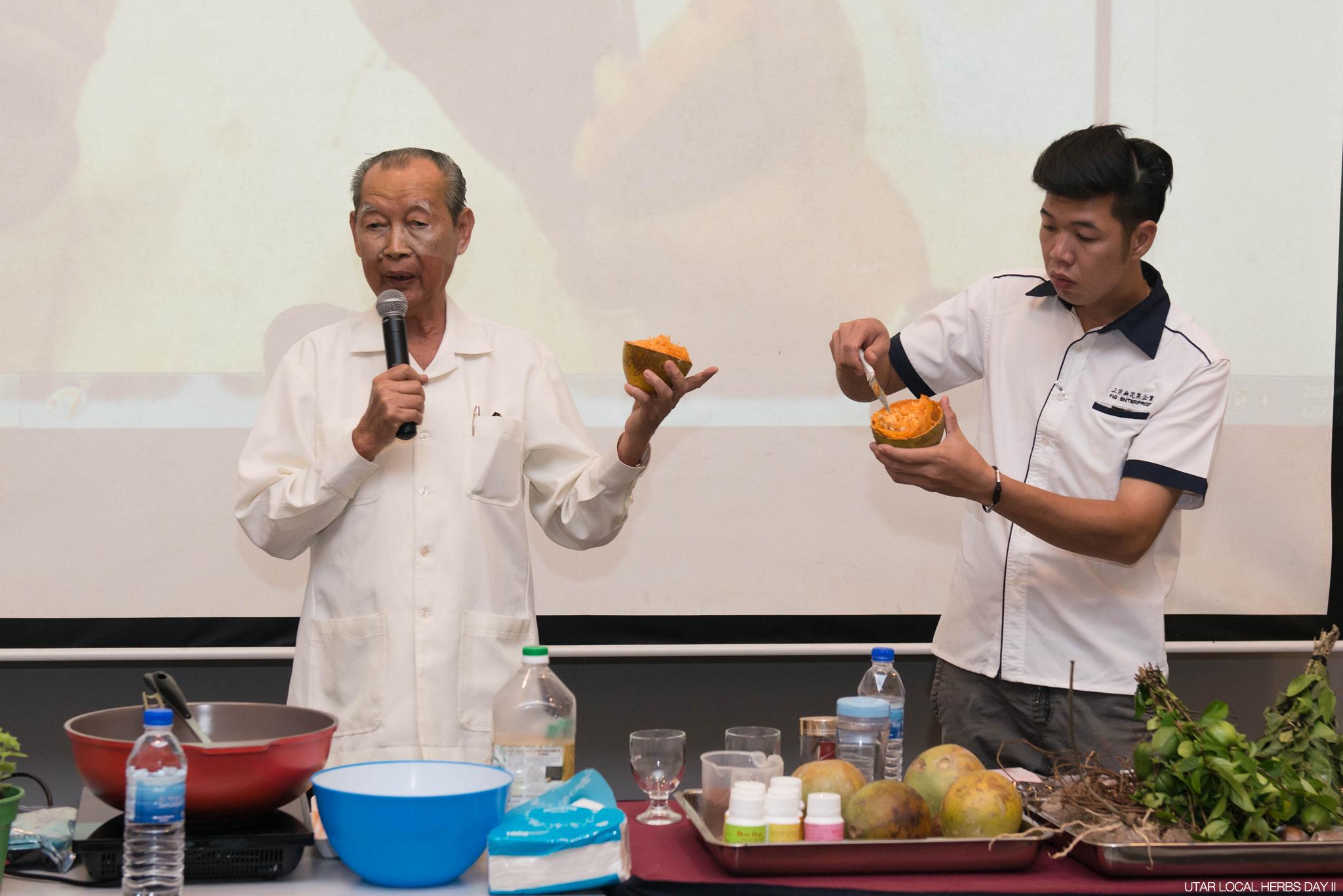
Chan (left) showing the participants how figs look like
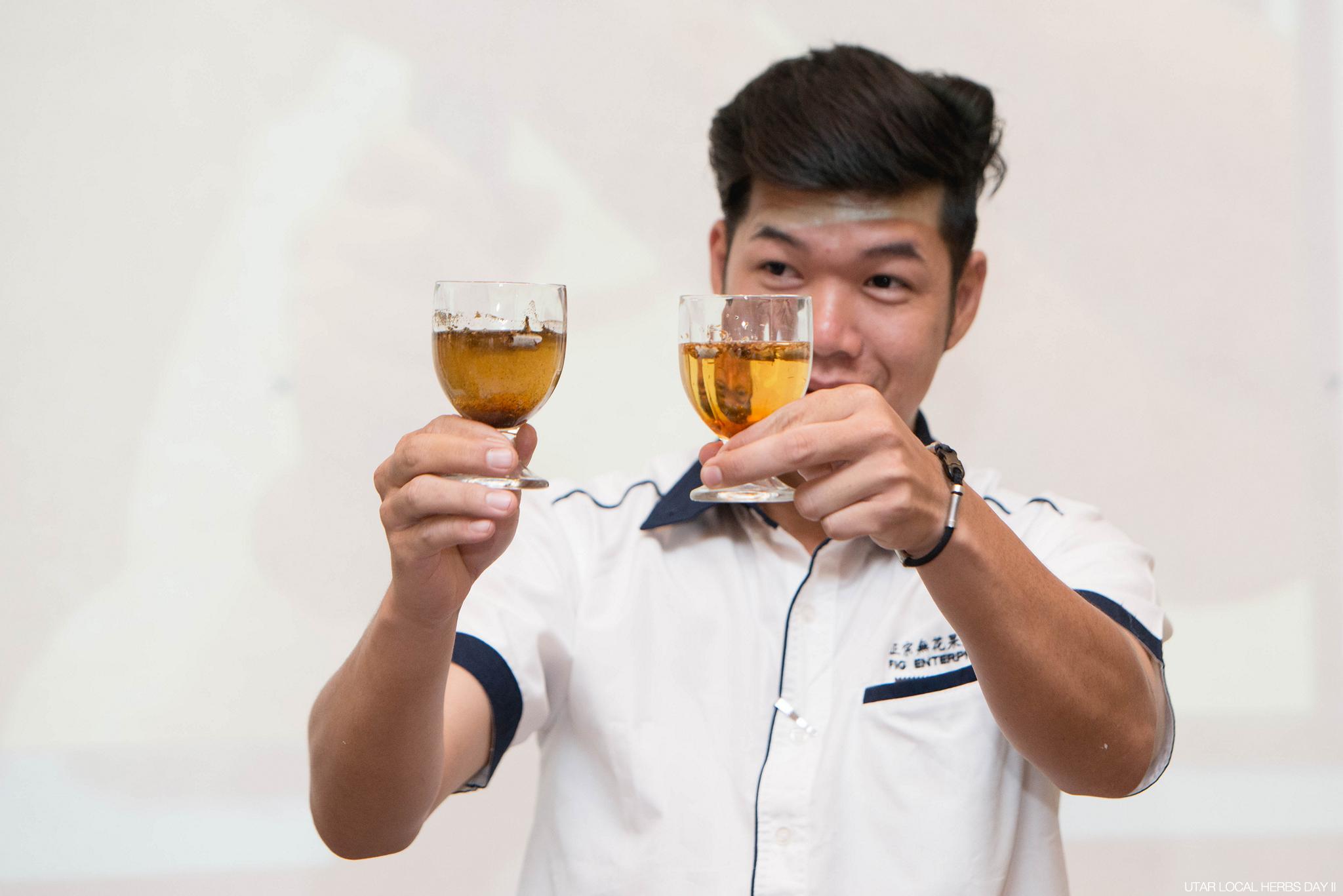
Demonstration on how the combination of herbs can resolve the nicotine (cigarette in water) by Chan’s assistant
Following were cooking demonstration sessions on the making of “Murungai Adai”, a healthy and gluten-free flat bread breakfast recipe by Department of Biomedical Science lecturer Annaletchumy Loganathan; a recipe on how to soothe cough with ginger and licorice - DIY cough drops by Department of Agricultural and Food Science lecturer Sim Kheng Yuen; Basil and Oregano Stir-fry Spaghetti, a herbal and spice infused pasta by Department of Agricultural and Food Science lecturer Chung Kok Heung; and Chicken Biscuit, a favourite snack of valuable herbs (cekor) by Department of Biomedical Science Dr Tan Gim Cheong and his team. Apart from gaining more understanding about the herbs, the participants also had the opportunity to taste the food they have prepared in each session.
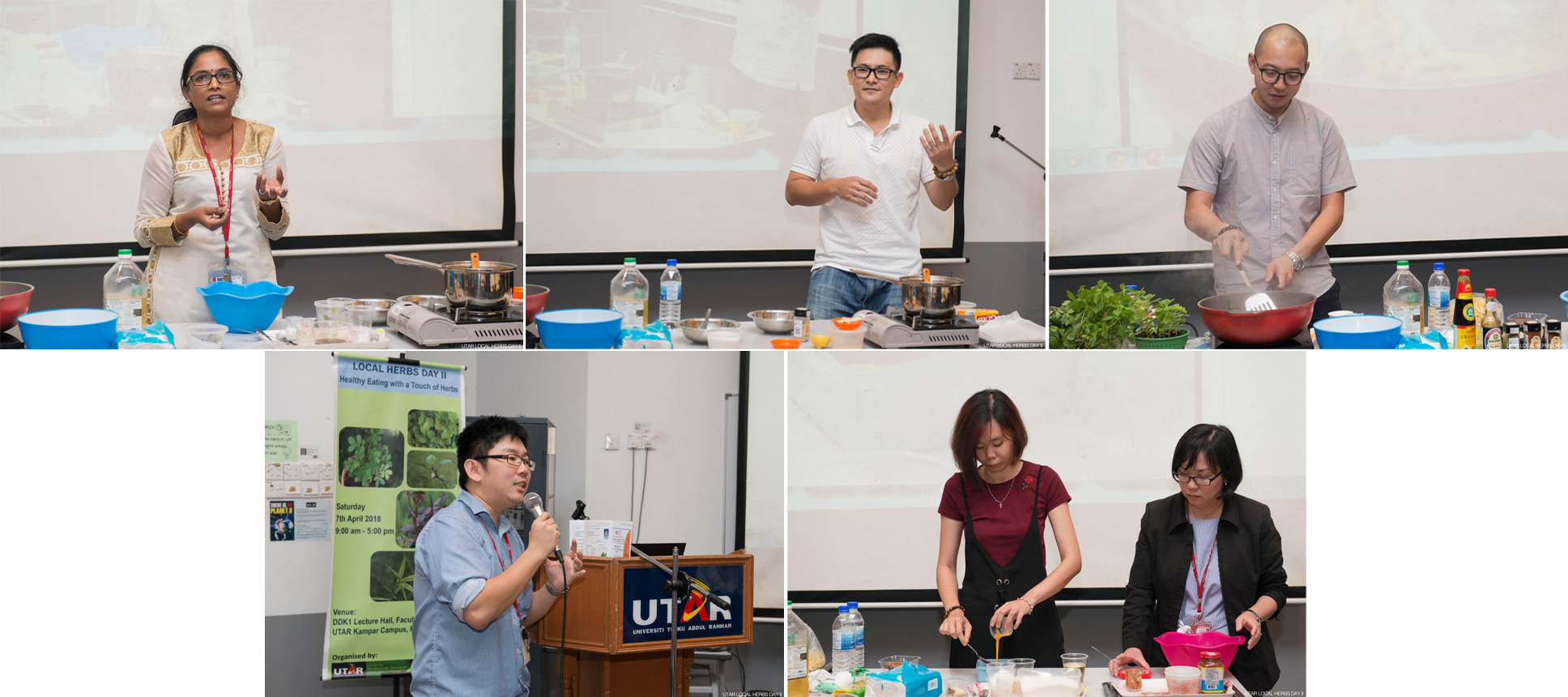
Clockwise from top left: Annaletchumy, Sim, Chung, and Dr Tan with his team members
In his closing remarks, FSc Dean Assoc Prof Dr Lim Tuck Meng expressed his gratitude to the organising committee, speakers, sponsors and participants for their support. He also introduced the establishment of FSc and the highlighted programmes and events of the faculty. “University exists to create and share knowledge with the society. FSc started in the year 2009 and we have established many new programmes ever since to produce manpower to the society,” he said. He encouraged the participants to share the knowledge and said, “Learning is a lifelong process, and whatever we have learned, if it is useful to ourselves and other people, we should share the knowledge so that the society and other people will grow to become better.”
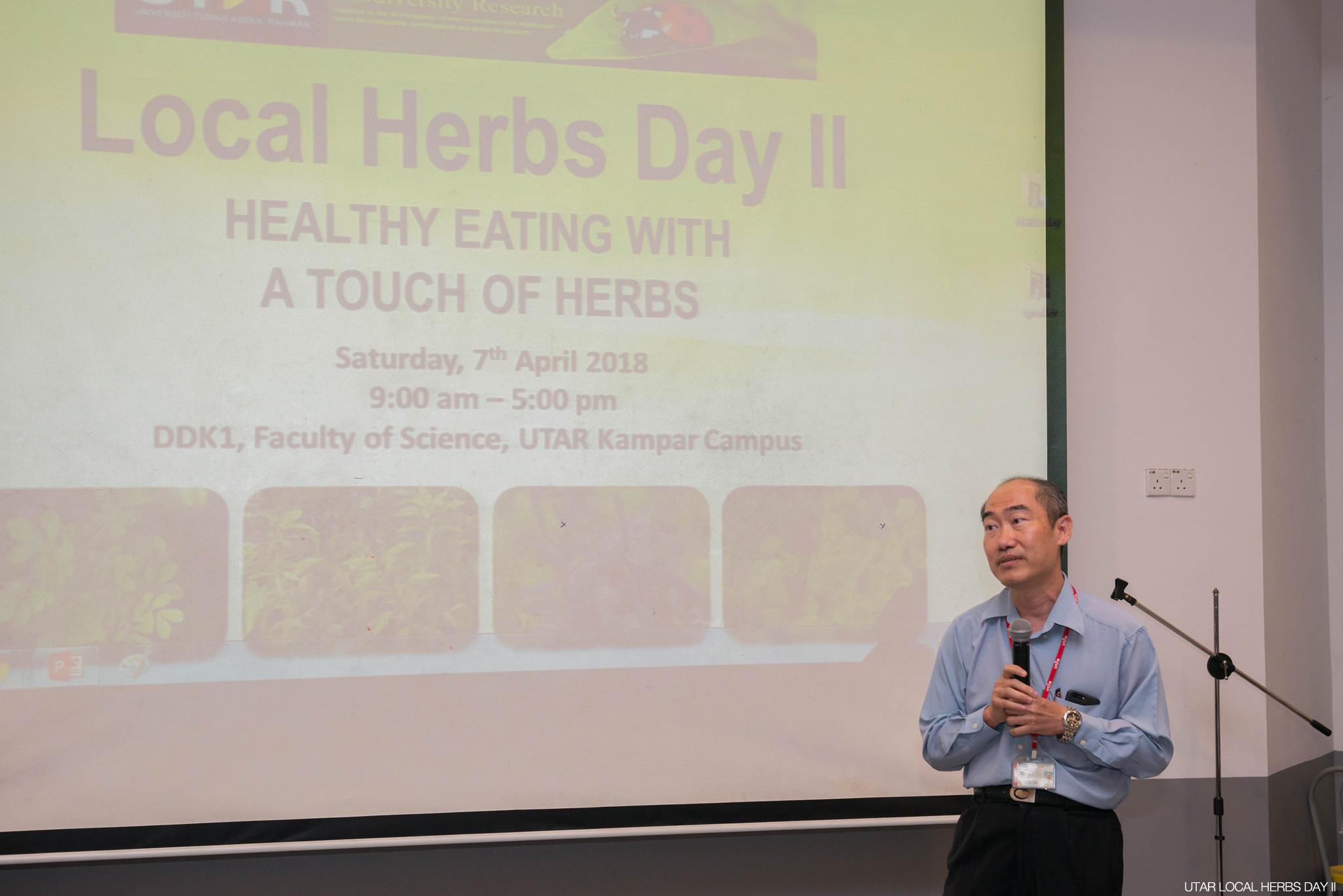
Dr Lim delivering his closing remarks
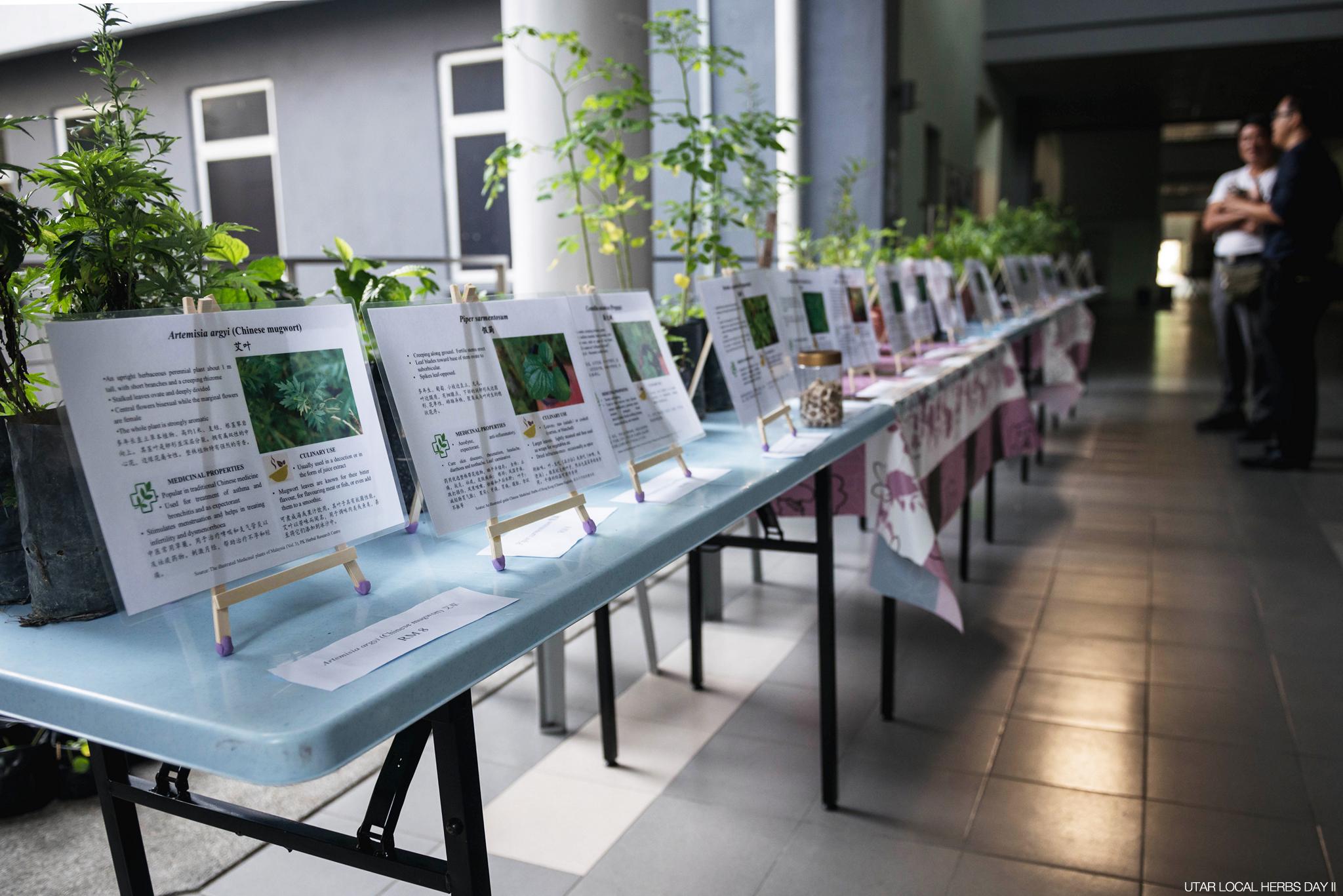
The herbs exhibition displaying 21 types of common but beneficial herbs

The participants learning about the herbs through the exhibition

The participants exchanging information
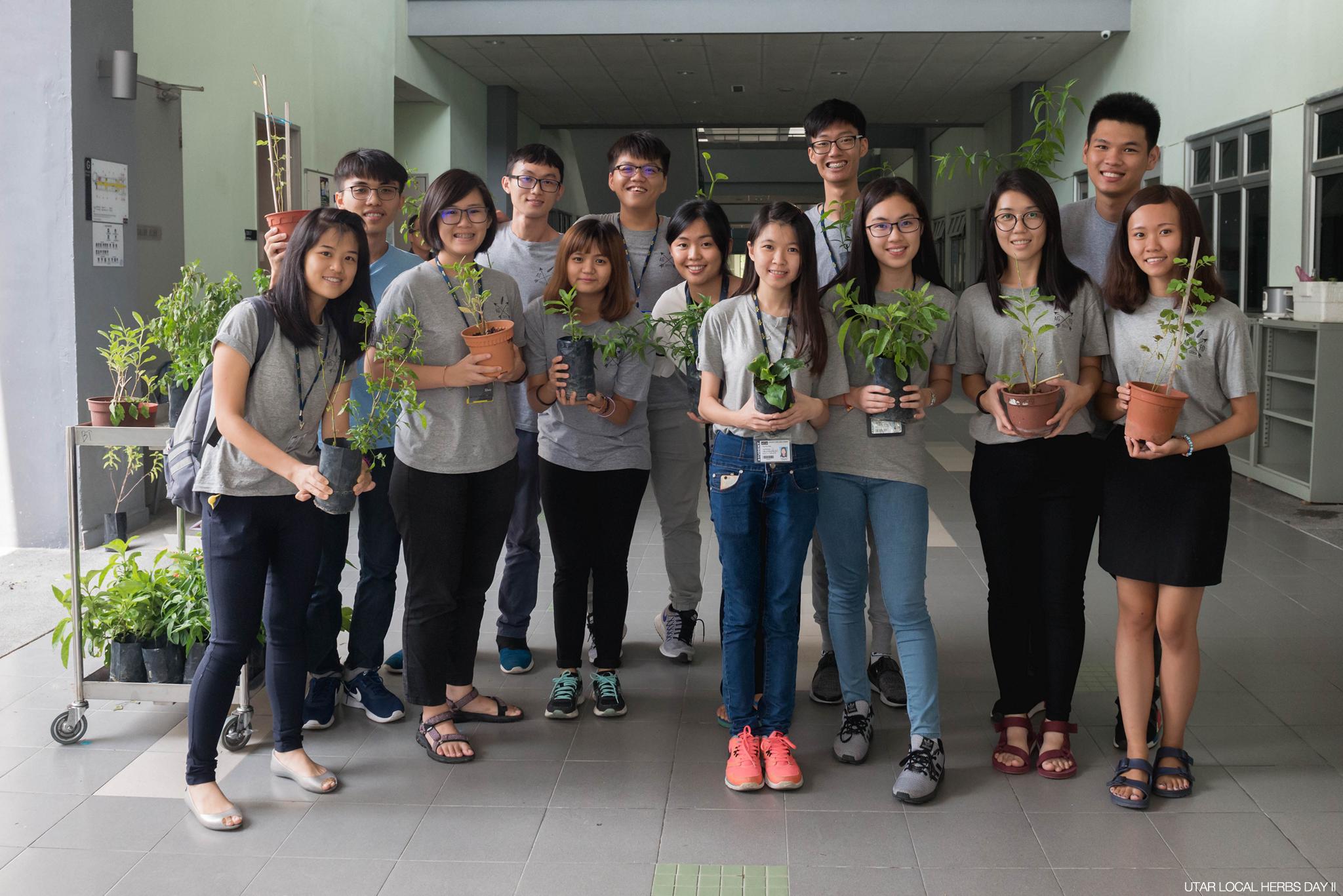
A group photo of student helpers from the Agriculture and Food Science Society after the seminar
© 2019 UNIVERSITI TUNKU ABDUL RAHMAN DU012(A).
Wholly owned by UTAR Education Foundation Co. No. 578227-M LEGAL STATEMENT TERM OF USAGE PRIVACY NOTICE